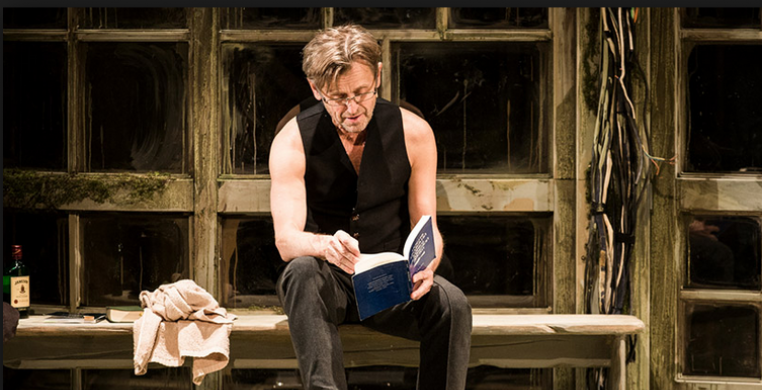It’s always fascinating to behold a great artist continuously reinventing himself in new and unexpected ways. We exalted Mikhail Baryshnikov’s brilliance as a ballet dancer without equal. We marveled that he was more than a competent film and stage actor, a gifted photographer, a director and producer, an impresario and champion supporter of developing artists in interdisciplinary projects.
“Brodsky/Baryshnikov” (Harris Theater, February 2-4) begins in silence as the former ballet superstar Mikhail Baryshnikov makes a slow, unmetered entrance through the back door of a decaying glass dacha that dominates the stage of the Harris Theater for Music and Dance, not as the brilliant dancer he once was, but as a man diminished by grief, returning to an abandoned summer home in search of remnants of its former occupant. He wears a black suit coat and vest and carries a small valise, as if perhaps intending to spend a brief interlude there as its inhabitant himself. Curiosity draws him in a meandering path from one corner to another within the one-room habitat, discovering, losing himself in memories of the past.
The promise is that we will discover with him and enter the life that once invigorated this hollow space. It is evening. The quietness of crickets chirping and the faint echo of angelic voices singing cast a reverent tone over the space, and we enter the transcendent realm of poetry, where everything is image and metaphor, or a place that must feel like heaven. Time stretches to eternity.
Baryshnikov’s role is at once tour guide and interpreter, eulogist and eulogized as he transforms into the physical embodiment of the poetry’s language, both paying homage to his deceased friend, Nobel Prize winner and poet laureate Joseph Brodsky, and channeling the poet’s presence through his own body.
He exits the glass cottage through downstage doors and comes to rest on a bench bordering its outer walls, opens the valise, and retrieves an alarm clock, a liquor bottle, and several small volumes of Brodsky’s poetry. He searches his pockets, retrieves a cigarette, but alas, no match, a charming testimony to the former dancer’s magnificent command of physical humor. He opens a volume, scans its pages, lights on one, and begins reading to himself in a barely audible whisper.
The language unfolds in space, the words escaping his body and taking flight in the melodic cadence of his and the poet’s native Russian, recited with the naturalness of human speech. English translations of the poems scroll across the roofline of the house.
It is going to be a play, and yet, it is not. Director Alvis Hermanis’s adaptation of Brodsky’s poems teases us into expecting a dramatic arc that tells a story, but which only ebbs and flows in the lugubrious murkiness of Brodsky’s obsession with death, decay, exile, and loss. Occasionally brilliant images emerge, only to descend back into Brodsky’s shadowy landscape.”I march to the beat of your shadow…” The glass walls fairly sigh in mal de siècle angst, our attention torn between the inert form of Baryshnikov sitting on the bench, and the projected subtitles above. We wish something would happen, and finally it does.
Baryshnikov stands, removes one article of clothing, then another, until he is barefoot and bare chested, remarkably chiseled and fit. He re-enters the glass house, the transparent walls a metaphor for the transparency of the poet’s soul. Spinning, Baryshnikov obeys the poem’s command to “wrap the room around myself” in a childlike frenzy.
The movement relieves the static stage, releasing the energy of the poem’s language into visual space. This happens three times throughout the ninety-minute homage. In “The Butterfly,” we are treated to the innocence of pure movement as Baryshnikov’s hands create the illusive flight of the butterfly, its brief life a poignant parallel to human existence. The animation that enlivens the stage during this interlude, and again in the poem that personifies tragedy in tortured rawness, is sorely missing throughout most of the drawn-out recital.
You didn’t have to understand Russian to recognize the difference between recordings of Brodsky’s overly-dramatic lamenting, veering close to monotony, and Baryshnikov’s naturalism, which brought sensitivity and honest reflection to the poems’ ideas. Baryshnikov’s honest representation of the poetry, and his truthfulness as an actor are certainly admirable, but “Brodsky/Baryshnikov” ultimately disappoints as a theatrical work. One can’t help but wish Hermanis had found more instrumental ways to harness his leading man’s considerable gifts as a physical actor and dancer to bring the richness of the written word to life on stage.


